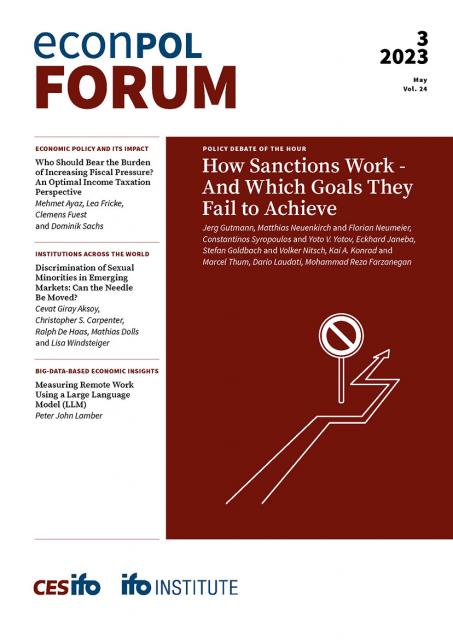How Sanctions Work - And Which Goals They Fail to Achieve
POLICY DEBATE OF THE HOUR
Articles included
POLICY DEBATE OF THE HOUR
Introduction to the Issue on How Sanctions Work - and Which Goals They Fail to Achieve
Chang Woon Nam
EconPol Forum 24 (3), 03-04
The Impact of Economic Sanctions on Target Countries: A Review of the Empirical Evidence
Jerg Gutmann, Matthias Neuenkirch, Florian Neumeier
EconPol Forum 24 (3), 05-09
Reflections on the Impact of Economic Sanctions
Constantinos Syropoulos, Yoto V. Yotov
EconPol Forum 24 (3), 10-14
The Export of Sanction Policies: Extraterritorial Sanctions and Geopolitical Conflict
Eckhard Janeba
EconPol Forum 24 (3), 15-18
On the Economic Effects of Financial Sanctions: Evidence from Germany
Stefan Goldbach, Volker Nitsch
EconPol Forum 24 (3), 19-22
Do Resource Sanctions Work?
Kai A. Konrad, Marcel Thum
EconPol Forum 24 (3), 23-26
Evidence and Policy Implications of Sanctions in the Long Run: The Case of Iran
Dario Laudati
EconPol Forum 24 (3), 27-30
Economic Sanctions and Military Expenditure in Iran: A Brief Survey
Mohammad Reza Farzanegan
EconPol Forum 24 (3), 31-35
ECONOMIC POLICY AND ITS IMPACT
Who Should Bear the Burden of Increasing Fiscal Pressure? An Optimal Income Taxation Perspective
Mehmet Ayaz, Lea Fricke, Clemens Fuest, Dominik Sachs
EconPol Forum 24 (3), 36-40
INSTITUTIONS ACROSS THE WORLD
Discrimination of Sexual Minorities in Emerging Markets: Can the Needle Be Moved?
Cevat Giray Aksoy, Christopher S. Carpenter, Ralph De Haas, Mathias Dolls, Lisa Windsteiger
EconPol Forum 24 (3), 41-43
BIG DATA-BASED ECONOMIC INSIGHTS
Measuring Remote Work Using a Large Language Model (LLM)
Peter John Lambert
EconPol Forum 24 (3), 44-49
In the light of geopolitical conflicts and instability, sanctions play an important role in the international economic policy debate - especially against countries such as Russia, Iran and China. Economic sanctions are often intended to achieve foreign and security policy goals: fighting terrorism, protecting democracy and human rights, or resolving conflicts. In this issue of EconPol Forum, our authors examine, using the evidence-based studies, the extent to which various sanctions have achieved their goals. How do they affect economic growth, trade, and prosperity? In addition, we want to understand their impact on sectoral development of agriculture, energy and mining, as well as on human rights, military spending or life expectancy. In this context, international trade, financial transactions, technology transfer and other economic activities, among others, are systematically studied. And researchers look at different types of sanctions, such as unilateral, multilateral, and extraterritorial.
“How Sanctions Work - And Which Goals They Fail to Achieve,” EconPol Forum 24 (3), CESifo, Munich, 2023.
